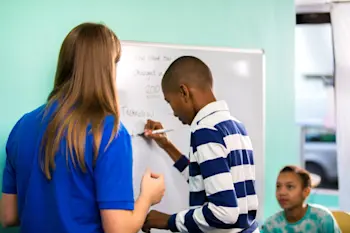When to start GCSE preparation?

It’s never too early to start thinking about your GCSE maths exams. However, starting revision too early might mean you run out of steam in the lead-up.
In this guide, we explore when is the best time to start GCSE preparation, alongside some handy revision tips and advice.
Let’s start preparing for GCSE success!
How to prepare for maths GCSE
Preparing for your maths GCSE requires dedication and practice. However, it’s important to balance revision with activities that make you feel happy and calm. Trust us – revising 24/7 won’t get you better marks!
The best thing to do is make a plan and stick to it. Start revising as early as possible, but ease yourself into it with manageable chunks and build up the hours and difficulty as you go.
How long does it take to prepare for GCSE?
GCSEs will be the first big exams you or your child will take and can have a big influence on your future educational path and career.
As you’ll be covering a range of subjects, you will need to start revising early to fit everything in.
It normally takes around six months to prepare to pass your GCSEs, so it’s a good idea to start the process at the beginning of Year 11. However, everyone is different and some people may need to spend more time studying than others.
Cramming revision sessions in a few weeks before the exams is never any fun and will most likely result in extra stress that you really don’t need. Marking out a longer period to revise means that you can take your time and will help you maintain a healthy study/life balance.
When do GCSE exams start?
The GCSE exam period is usually between May and June in Years 10 and 11.
When should you start studying for GCSEs?
We recommend starting GCSE revision 6 months before your exams begin. This should give you enough time to go over everything that’s covered in the exams a few times and help information stick in your mind, without overloading yourself.
How many hours study a day for GCSE?
Slow and steady wins the race! It can be a good idea to start by revising just a few hours a week six months before your exam. This will help you get some good revision habits in place ready for later on in the year.
Three months before your exam, you can turn it up a notch and start revising for an hour or two every couple of days.
One month before your exam, you could increase your study time to an hour a day.
Then one week before, you could spend a few hours each day revising.
Try not to go overboard! The happier and calmer you are when you enter your exam, the more likely you will feel equipped to do your best. Make sure you get plenty of sleep, eat well, and set aside time for relaxation and fun with friends.
We also wouldn’t recommend revising the night before the exam. By this point, you will be well prepared and will find it hard to take in anything new. Taking a night off to get a good rest and collect your thoughts will do you a world of good!

GCSE preparation online
Here are some online resources you can use to prepare for the GCSE maths exam…
Practice papers
Past exam papers are a great way of getting to understand the types of questions that might come up in your maths exam.
Helpful maths revision websites
Try these maths revision websites…
BBC Bitesize for topic-by-topic revision
Quizlet for quizzes and flashcards to test your knowledge
NRICH for maths puzzles
Get Revising for past papers
Online maths tuition
Online maths tuition is great if you’re trying to fit tutoring into a busy schedule as it can be done anywhere, anytime! It will also provide you with lots of extra revision resources that you can use whenever it suits you.
GCSE preparation tips
We’ve gathered some GCSE revision tips to help you ace your maths preparation…
Set yourself an achievable goal
First things first, what do you want to achieve in your exam? Is it a specific GCSE result to help you get into the University of your dreams? Or is it just to improve on your work from last year?
Setting a SMART goal (specific, measurable, achievable, realistic, time-bound) will give you a focus for your preparation and help to keep you motivated throughout exam season.
Create a revision timetable
Next up, plan your time carefully. A revision timetable should be broken down into:
Which subject you will be practising each day/week
Which topics within that subject you will be focusing on at any time
How long your revision sessions will be
The specific tasks you will be practising in each session
Creating a timetable with a space to ‘tick’ off tasks when they are completed can help to give you that sense of satisfaction and spur you to keep going!
Try writing your plan on a whiteboard or notice board and placing it somewhere you can see it clearly.
Alternatively, there are lots of digital tools that can help you plan an effective revision timetable. Some can even send you regular reminders and progress updates!
Find a study area
Finding a quiet, calm, distraction-free place to study will help you concentrate. Maybe it’s a spare room in the house, a garden shed, the library, or an empty classroom. Wherever it is, make sure it has a comfortable table and chair to sit at, and you have everything you need to hand.
Vary your revision methods
Mix things up! It can get boring reading the same information over and over again, or solving maths problems using the same method. To keep your brain active and engaged, try something different like revising in a different place, using different revision tools or studying with your friends.
It’s all about the notes!
This is a really important one. Make sure you listen and take notes during your lessons! Your teachers are the best source of information and the notes you take in their classes will be super helpful when it comes to revising later down the road.
Try to keep all of your notes for each subject organised and in one place so you can come back to them when you need them.
Turn off your notifications
That little buzz can be so tempting! But did you know that just one phone notification can lead to 15 minutes of procrastination? Try turning off your notifications for just a couple of hours while you study.
It might even make coming back to your phone even more exciting!
Don’t forget to take study breaks!
Taking regular study breaks is vital. No one can revise effectively when they are tired. It’s important to take breaks to rest, get away from your screen and do something that makes you feel good.
Maybe it’s a game of football, a phone call with a friend, or getting out into nature – whatever you like to do in your spare time – don’t cut it out of your routine!
Develop good study habits
Good study habits include:
Sticking to your planned revision hours
Not working really late at night or for long hours
Taking regular breaks
Rewarding yourself when you hit your revision targets
Asking for help if you need it
Looking after your health and wellbeing
Join a study group
For some people, studying with friends or classmates is really helpful. Being able to talk through a question as a group and get other perspectives can really help you develop your own understanding. It also provides a great support network to talk through your worries about the exam.
Ask your teachers for support
If you’re finding something difficult, your teachers are there to help! They want you to feel equipped to do your very best in the exam and will have a good idea of what’s going to come up. Speak to your teacher if you need some more support or help with a specific problem. They will help you find a solution!
Try a new learning tool
There are so many learning tools out there to help with exam preparation! Maybe it’s a revision app or an app that limits your time on social media – do some research to find one that works for you or explore our GCSE maths revision resources.
Get some help from a tutor
Sometimes, an outside perspective can be just what you need to tackle a problem area. A GCSE maths tutor can help you to develop strategies for the exam so you feel more confident.
Take it one step at a time
We know that exams can be stressful. Sometimes, you just need to take a step back and do something completely different until you feel ready to get back to work. The most important thing is your wellbeing and happiness.
Our guide on dealing with GCSE anxiety is full of tips to help you manage your stress and get back to feeling yourself. Remember – slow and steady wins the race!

GCSE preparation courses and tuition
Enrolling on a GCSE maths preparation course can help take the worry out of the exams and help you on your way to achieving your goals.
Our specialist GCSE maths tuition can improve grades, fill in knowledge gaps, boost confidence and help you master exam techniques. With just one hour a week with an online maths tutor and unlimited access to revision materials, we can support you to take your next steps. Why not get in touch to find out how we can help your child prepare for their maths GCSEs?
Cancel anytime
No joining fee
In centre or online
Memberships to suit you
Cancel anytime
No joining fee
In centre or online
Memberships to suit you
Cancel anytime
No joining fee
In centre or online
Memberships to suit you




